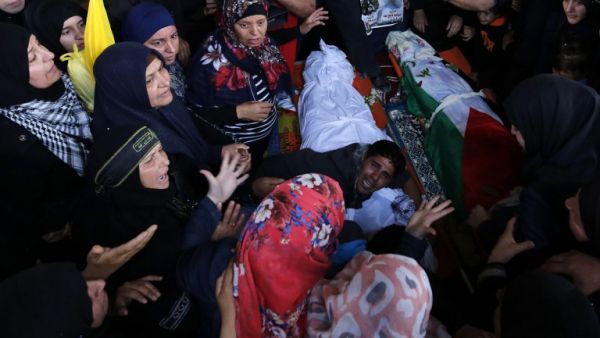The Israeli government on Friday announced that it would be releasing for burial seven out of 10 bodies of slain Palestinians currently being held by Israeli authorities, according to Israeli news website Haaretz.
Haaretz reported that the government’s security cabinet informed the High Court of its decision to release the bodies of those who had been accused of committing “terrorist attacks” against Israelis in recent months, and that three of the ten belonged to “terrorists affiliated with the Hamas group in Gaza, and thus will not be handed over.”
As has been customary with the release of bodies of slain Palestinians in the past, Israel agreed to hand over the bodies to the families of the deceased only if they agree to the Israeli army’s preconditions regarding the funerals.
Following a petition filed by the relatives of five occupied West Bank alleged assailants whose bodies are being held, the security cabinet members decided that "already at this stage it is possible to take action and return seven out of 10 bodies discussed in different petitions," Haaretz said.
Haaretz quoted the government as saying that the preconditions for releasing the bodies -- which in the past have dictated grave locations, the number of family members who can attend the funeral, funeral times, and insurance fines -- “are intended to assure that the funerals don't turn into displays of incitement and support for terrorism."
Israel’s State Attorney said that the matter regarding the remaining three bodies needed “to be studied further,” due to the fact that they were affiliated with Hamas, and that one of the bodies belongs to 17-year-old Muhammad Nasser Tarayra, from the Hebron-area village of Bani Naim, who stabbed and killed 13-year-old Hillel Yaffe Ariel in her home in the Kiryat Arba settlement last June.
The state requested an additional 60 days to prepare its position regarding the three bodies.
Israeli authorities dramatically escalated a policy of withholding Palestinian bodies killed by Israeli forces following the emergence of a wave of unrest across the occupied Palestinian territory and Israel in October 2015, having repeatedly claimed that funerals of Palestinians had provided grounds for “incitement” against the Israeli state.
However, following an uproar of protest among Palestinians over the policy, Israeli authorities began scaling down the practice, although a number of bodies still remain withheld.
When Israeli authorities have decided to return slain bodies and allow funerals in the occupied Palestinian territory, the ceremonies have been typically restricted by a long list of conditions imposed by Israeli authorities, including limiting the number of attendees and the deployment of Israeli soldiers throughout the event.
Palestinian families have also been forced to pay large financial deposits to the Israeli government as a collateral for potential “incitement” during the funerals and to ensure that families abide by Israeli-imposed conditions.
Israeli police announced in June that slain Palestinians from occupied East Jerusalem suspected of “terrorism” would no longer be able to have funerals in their neighborhoods or villages, but would instead be buried in cemeteries chosen by the Israeli police.
A joint statement released by Addameer and Israeli minority rights group Adalah in March condemned Israel’s practice of withholding bodies as "a severe violation of international humanitarian law as well as international human rights law, including violations of the right to dignity, freedom of religion, and the right to practice culture."
The statement said it appeared "many" of the Palestinians whose bodies Israel was holding had been "extrajudicially executed by Israeli forces during alleged attacks against Israelis, despite posing no danger."








